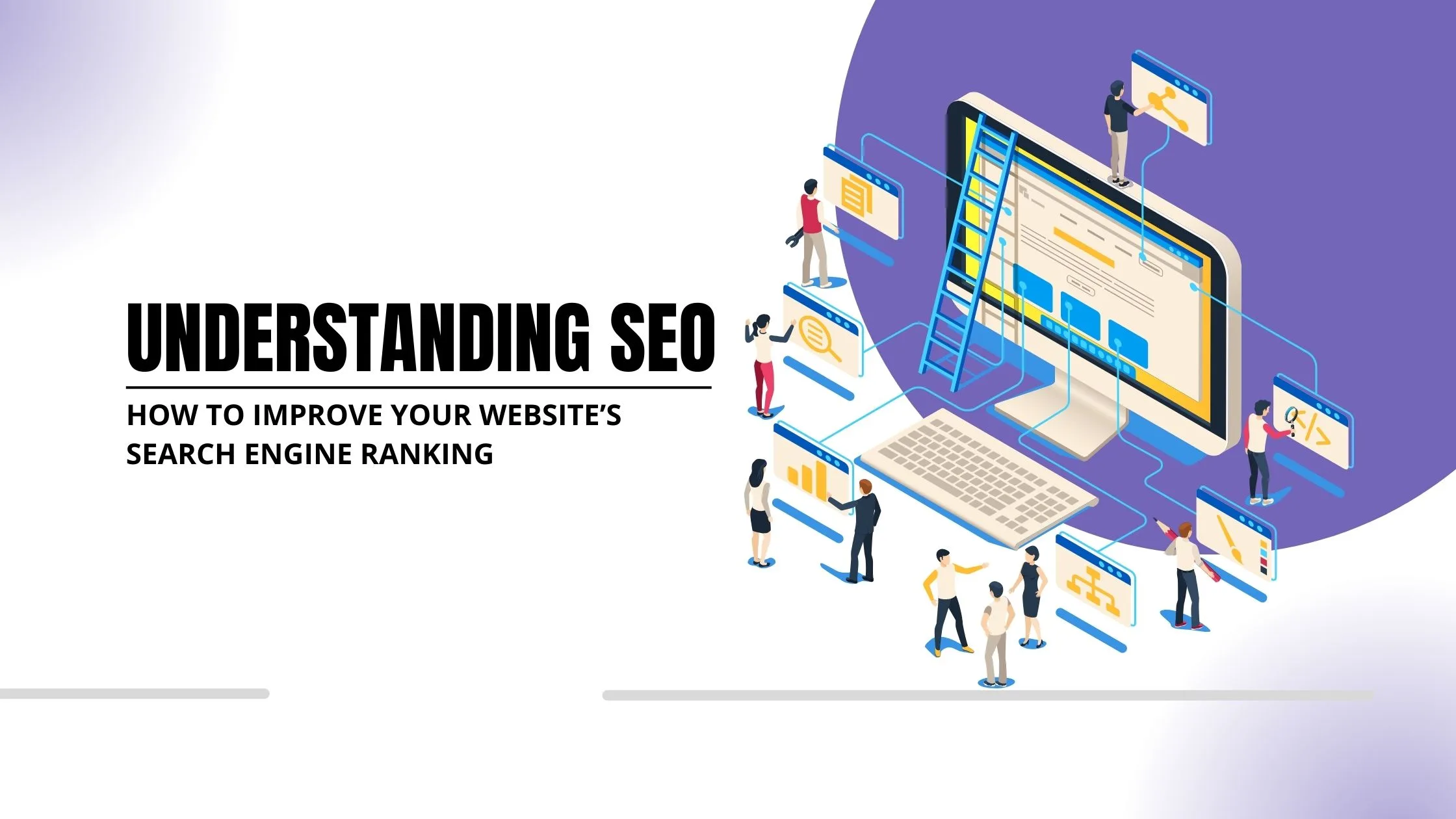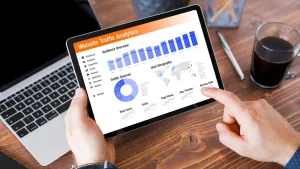Understanding SEO: How to Improve Your Website’s Search Engine Ranking
Are you tired of your website being buried under a sea of search results? Wish there was a way to give it the attention it truly deserves? Well, look no further because we’ve got the ultimate guide to understanding SEO and improving your website’s search engine ranking!
In today’s digital world, having a top-notch website is not enough; you need to master the art of Search Engine Optimization (SEO) if you want to stand out from the crowd. So buckle up and get ready for some game-changing strategies that will take your website straight to Google’s front page!
What is SEO and why is it important?
SEO, or search engine optimization, is the process of improving your website’s visibility and ranking on search engines like Google. It involves optimizing various aspects of your website to make it more attractive to search engines, increasing the chances of appearing in top search results for relevant keywords.
In today’s digital age, where almost everything is done online, having a strong online presence is crucial for businesses and individuals alike. With millions of websites competing for attention on the internet, it can be challenging to stand out and attract potential visitors. This is where SEO comes into play – by implementing effective SEO strategies, you can improve your website’s organic traffic and attract quality leads from search engines.
But why exactly is SEO important? Let’s take a closer look at some key reasons:
1. Increases Visibility and Organic Traffic
The higher your website ranks on search engine results pages (SERPs), the more visible it will be to users searching for related content. According to studies, websites that appear on the first page of Google receive 91.5% of all traffic from that particular search query. This clearly shows that a top-ranking position is critical if you want to generate significant organic traffic to your site.
2. Boosts Credibility and Trust
When people use search engines to find information or products/services they need, they tend to trust websites that rank high on SERPs more than those buried down below. A high ranking signals credibility and trustworthiness in the eyes of users, which can significantly impact their decision -making process. By optimizing your website for search engines, you can build authority and establish your brand as a credible source within your industry.
3. Cost-Effective Marketing Strategy
Compared to other online marketing methods, SEO is relatively cost-effective, making it an ideal strategy for small businesses and startups with limited marketing budgets. Unlike paid advertising, where you have to pay every time someone clicks on your ad, SEO allows you to attract organic traffic without incurring any additional costs.
4. Targets Quality Leads
SEO targets users who are actively searching for products or services related to your business. This means that the people coming to your site through search engine results are already interested in what you have to offer, making them quality leads. By optimizing for relevant keywords, you can attract highly targeted traffic that is more likely to convert into customers or clients.
5. Long-Term Results
While it may take some time and effort to see significant results from SEO, the benefits can be long-term. Unlike paid advertising, which stops generating traffic once you stop paying for it, SEO continues to drive organic traffic and improve your website’s visibility even after the initial work has been done.
The basics of search engine algorithms
Search engine algorithms are the backbone of search engines such as Google, Bing, and Yahoo. They are complex mathematical formulas that determine how websites are ranked in a search engine’s results page. Understanding these algorithms is crucial for improving your website’s search engine ranking, also known as SEO (Search Engine Optimization).
The main purpose of a search engine algorithm is to provide users with the most relevant and useful information based on their query. This means that the algorithm evaluates various factors to determine which web pages should be displayed first in a user’s search results.
One important factor that search engine algorithms consider is keyword relevance. Keywords are words or phrases that users type into a search bar when looking for information. The algorithm scans through different web pages to identify those with the most relevant keywords related to the user’s query. Therefore, it is essential to optimize your website’s content with relevant keywords that relate to your business or industry.
Another critical factor in search engine algorithms is website authority and credibility. Search engines prioritize websites with high authority and credibility because they are seen as more trustworthy sources of information. Authority can be built through quality backlinks from reputable websites, social media presence, and high-quality content.
In addition to these factors, the algorithm also considers user experience when ranking websites. A well-designed website with fast loading speed and easy navigation will rank higher than a poorly designed one as it provides a better user experience.
Keyword research and how to choose the right keywords for your website
Keyword research is a crucial step in optimizing your website for search engines. It involves identifying and analyzing the specific words or phrases that users type into search engines when looking for information related to your business or industry. By choosing the right keywords, you can attract more relevant traffic to your site and improve its search engine ranking.
Here are some tips on how to conduct keyword research and select the best keywords for your website:
1. Understand Your Target Audience: Before you start researching keywords, it’s important to have a clear understanding of your target audience. Who are they? What are their interests and preferences? Knowing your audience will help you identify the language they use when searching for information online.
2. Brainstorm Relevant Topics: Make a list of topics related to your business or industry that you think people might be interested in searching for. This will give you a starting point for your keyword research.
3. Use Keyword Research Tools: There are several free and paid keyword research tools available online, such as Google Keyword Planner, SEMrush, and Ahrefs. These tools provide valuable insights into search volume, competition level, and other important metrics for each keyword.
4. Analyze Search Intent: When conducting keyword research, it’s essential to consider the intent behind each search query. Are people looking for general information about a topic, or are they trying to find a specific product or service? Understanding search intent will help you choose relevant keywords that align with what users are actually looking for.
On-page optimization techniques
On-page optimization techniques are essential for improving your website’s search engine ranking. These techniques involve optimizing the content and structure of your web pages to make them more visible and relevant to search engines. By implementing these strategies, you can increase your website’s chances of appearing at the top of search engine results pages (SERPs) and driving more organic traffic to your site.
1. Keyword Research and Placement:
Keyword research is a crucial first step in on-page optimization. It involves identifying the most relevant and high-volume keywords related to your business or industry that users are using in their search queries. Once you have a list of keywords, strategically place them throughout your web page’s content, such as in the title tag, meta description, headings, image alt tags, and within the body text. However, be careful not to overstuff keywords as it can lead to keyword stuffing penalties from search engines.
2. Quality Content Creation:
Search engines value fresh and quality content that provides value to users. Therefore, creating high-quality content should be a top priority when it comes to on-page optimization techniques. Make sure your content is well-written with proper grammar and spelling while also being informative and engaging for readers. Including relevant keywords naturally in your content will also help improve its visibility to search engines.
– Title tags, meta descriptions, and header tags
When it comes to improving your website’s search engine ranking, there are certain technical elements that play a crucial role. These include title tags, meta descriptions, and header tags. In this section, we will delve deeper into these elements and understand how they impact SEO.
Title Tags:
Title tags or page titles are HTML elements that define the title of a webpage. They appear at the top of the browser window and serve as the clickable headline for a search result. Title tags should accurately describe the content of a webpage while also incorporating relevant keywords.
The length of title tags is important as well. Google typically shows only 50-60 characters in their search results, so it is recommended to keep your title tag within this limit to ensure it is fully displayed.
Meta Descriptions:
Meta descriptions are short snippets of text that provide an overview of what a webpage is about. They appear below the title tag in search engine results and can influence whether a user clicks on your link or not.
While meta descriptions do not directly impact SEO rankings, they can indirectly affect it by increasing click-through rates (CTR). A well-written meta description with relevant keywords can entice users to click on your link, which signals to Google that your website is valuable for those particular keywords.
Header Tags:
Header tags refer to headings and subheadings within a webpage’s content. They use HTML code such as
,
,
and so on to indicate different levels of importance for each heading .
Header tags not only make your content more organized and readable for users, but they also provide structure for search engines to understand the hierarchy of your content. It is important to use relevant keywords in your header tags as they hold more weight in search engine algorithms compared to regular text.
In conclusion, title tags, meta descriptions, and header tags play an important role in improving your website’s search engine ranking. By incorporating relevant keywords and accurately describing the content of your webpage through these elements, you can increase your chances of appearing higher in search results and attracting more organic traffic.
– Content optimization and keyword placement
In order to improve your website’s search engine ranking, it is crucial to optimize your content and strategically place keywords throughout your website. This involves incorporating relevant keywords and phrases into your website’s content in a natural and organic way.
Here are some key tips for optimizing your content and effectively placing keywords for better SEO:
1. Conduct keyword research: The first step in optimizing your content is to conduct thorough keyword research. This involves identifying the most relevant and high-ranking keywords related to your business or industry. There are various tools available, such as Google Keyword Planner, SEMrush, or Ahrefs, that can help you find the right keywords for your website.
2. Use long-tail keywords: Long-tail keywords are longer phrases that are more specific and targeted than broad keywords. They have less competition and can help drive more qualified traffic to your website. Incorporate long-tail keywords into your content naturally to improve its relevance and visibility.
3. Place keywords strategically: Once you have identified the best keywords for your website, it is important to place them strategically throughout your content. This includes using them in titles, headings, subheadings, meta descriptions, image alt tags, and within the body of the text itself.
– Image optimization
Image optimization is a crucial aspect of search engine optimization (SEO) that is often overlooked by website owners. It involves optimizing images on your website to make them more visible and easily accessible to search engines, ultimately improving your website’s search engine ranking.
Why is image optimization important for SEO?
When we talk about SEO, we usually think about keywords, backlinks, and content. However, images play an equally important role in ensuring that your website ranks well on search engines. Here are some reasons why image optimization should be an essential part of your SEO strategy:
1. Improved user experience: High-quality images can enhance the overall user experience of your website. This can lead to longer session times and lower bounce rates, which are both factors that search engines consider when ranking websites.
2. Increased visibility: Search engines use complex algorithms to determine the relevance and quality of a webpage. When you optimize your images correctly, it becomes easier for these algorithms to understand what your page is about and rank it accordingly.
3. Additional traffic source: By optimizing images with relevant keywords and tags, you increase the chances of appearing in Google Images or other image-based searches. This means that people looking for specific types of images will also be directed to your website.
4. Faster loading time: Large or unoptimized images can slow down the loading speed of a webpage significantly. With more people accessing websites through mobile devices with limited data plans, having optimized images can improve the overall performance of your site and result in higher rankings.
Off-page optimization strategies
Off-page optimization refers to the actions taken outside of your website that can positively impact your search engine ranking. While on-page optimization focuses on optimizing the content and structure of your website, off-page optimization strategies aim to improve its credibility and authority in the eyes of search engines.
Here are some key off-page optimization strategies that you can implement to improve your website’s search engine ranking:
1. Link Building:
Link building is one of the most important off-page SEO strategies. It involves acquiring backlinks from other websites to your own. Backlinks act as a vote of confidence for your website, indicating to search engines that other sites find your content valuable and trustworthy. The more high-quality backlinks you have, the higher your website will rank in search results.
However, it’s essential to note that not all backlinks are created equal. Quality is more important than quantity when it comes to link building. Aim for getting links from authoritative websites with relevant and quality content.
2. Social Media Marketing:
Social media platforms have become an integral part of our daily lives, and they also play a significant role in off-page SEO. Sharing your content on social media not only drives traffic but also increases its visibility and potential for earning backlinks.
Moreover, having an active presence on social media shows search engines that you are engaged with your audience and provides another way for people to discover and engage with your content.
– Backlinks and their importance in SEO
Backlinks, also known as inbound links or external links, are one of the most critical factors in determining a website’s search engine ranking. In simple terms, backlinks are hyperlinks from other websites that direct users to your site. These links act as “votes” for your website’s content and authority, indicating to search engines that your website is trustworthy and relevant.
The importance of backlinks in SEO cannot be overstated. They play a vital role in how search engines evaluate and rank websites for specific keywords or topics. Here are some reasons why backlinks are crucial for improving your website’s search engine ranking:
1. Enhances Authority and Trustworthiness: Backlinks signal to search engines that other websites consider your content valuable enough to link back to it. This endorsement from authoritative sites improves your website’s credibility and trustworthiness, boosting its overall authority in the eyes of search engines.
2. Increases Organic Traffic: Backlinks have a significant impact on organic traffic – visitors who find your site through unpaid sources like search engines. When high-quality websites link back to you, they provide an opportunity for their audience to discover and visit your site, ultimately increasing organic traffic.
3. Improves Search Engine Indexing: Search engines use crawlers (a.k.a., bots) to analyze websites’ content and index them accordingly in their databases. Backlinks serve as a roadmap for these crawlers, making it easier for them to navigate through different pages on your site quickly.
– Social media presence and its impact on search engine ranking
Social media has become an integral part of our daily lives, with millions of people using platforms such as Facebook, Instagram, Twitter, and LinkedIn to connect with friends, share content, and follow their favorite brands. However, did you know that your social media presence can also have a significant impact on your website’s search engine ranking?
In recent years, search engines like Google have started incorporating social signals into their algorithms to determine the relevance and authority of a website. This means that having a strong presence on social media can help boost your website’s search engine ranking.
One way in which social media affects SEO is through link building. When you share your website’s content on social media platforms and it gets shared by others, it creates backlinks to your site. Backlinks are one of the key factors considered by search engines when determining the credibility and authority of a website. The more backlinks you have from reputable sources, the higher your website will rank in search results.
Tools to help improve your website
There are numerous tools available that can help improve your website’s search engine ranking and ultimately increase its visibility on the internet. In this section, we will discuss some of the most popular and effective tools that you can utilize to optimize your website for search engines.
1. Keyword Research Tools: Keywords are a crucial component of SEO as they help search engines understand what your website is about. Using keyword research tools such as Google Keyword Planner, SEMrush, or Ahrefs can help you identify relevant keywords for your website and determine their search volume and competition level.
2. On-Page Optimization Tools: On-page optimization refers to the process of optimizing individual web pages to improve their ranking in search results. There are several tools available like Yoast SEO, MozBar, and Screaming Frog that can analyze your website’s content, meta tags, and internal links to ensure they are optimized for SEO.
3. Backlink Analysis Tools: Backlinks play a significant role in improving your website’s authority and credibility in the eyes of search engines. Tools like Majestic, Ahrefs, and Moz Open Site Explorer can help you monitor backlinks to your site as well as those of your competitors.
Conclusion
In today’s fast-paced and competitive digital landscape, having a strong online presence is crucial for any business or organization. By implementing effective SEO strategies, you can significantly improve your website’s search engine ranking and ultimately drive more traffic to your site. Remember to prioritize creating high-quality content and utilizing keywords strategically in order to attract the right audience. With these tips in mind, you can take the necessary steps towards improving your website’s SEO and achieving greater success in the online world.





